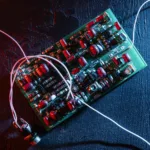Introduction
In today’s digital era, the demand for accurate and reliable calibration equipment increases. In this context, a multifunction calibrator (MFC) has become more crucial than ever. These all-in-one calibrators play a significant role by providing the versatility to test, calibrate, and verify a broad array of instruments with different measurement needs. Understanding these instruments can help maintain the integrity of your operations and guarantee consistent, reliable results. This guide covers everything you need to learn about these invaluable calibration tools.
Understanding the Basics of Calibration: Why Is It Important?
Calibration is a process that ensures that an instrument provides accurate measurements by comparing it with a standard reference or benchmark. It’s an essential part of maintaining the quality and reliability of equipment, especially in industries requiring robust precision. For example, in electronics, calibrating a voltmeter means adjusting it to ensure that the voltage readings it displays match the known voltage of a reference source. Additionally, calibration also helps detect and minimise errors, ensuring compliance with regulatory standards.
What Are Multi Function Calibrators? Definition and Functionality
A multifunction calibrator is an all-in-one device designed to calibrate multiple instruments by measuring and simulating various parameters. Unlike single-function calibrators, multifunction calibrators combine the functionality of different types of calibrators into one device. This versatile functionality makes them cost-effective, time-saving, and highly efficient options. A multi-function calibrator can measure parameters like voltage, current, frequency, resistance, pressure, pulses, and temperature, depending on the model. They can calibrate a variety of test and measurement instruments, including thermometers, pressure transducers, and voltmeters, by producing precise reference signals that can be compared against the device under test.
Benefits of Using Multi-Function Calibrators Explained
Using a multi-function calibrator brings unparalleled benefits in terms of efficiency, cost savings, and flexibility. By eliminating the need for multiple single-function calibrators, businesses can reduce equipment costs and streamline calibration workflows. Additionally, multi-function calibrators can help detect faults early, improving system reliability.
The Role and Importance of Multifunction Calibrators in Industrial Settings
Accurate measurements are non-negotiable in industries like power generation, manufacturing, and pharmaceuticals. Multi-function calibrators streamline the calibration process by allowing operators to test multiple types of instruments with one device, saving time and resources. They also help ensure that all equipment is working within specified tolerance limits, which is vital for product quality and safety.
Types of Multi Function Calibrators: Exploring Their Functions and Uses
Multi function calibrators are available in several types based on their design, shape, and measurement parameters, such as:
Voltage and Current Calibrators
Voltage and current calibrators are precision instruments designed to generate stable voltage or current signals. They are essential for testing and calibrating measuring devices such as multimeters and oscilloscopes, ensuring accuracy in electrical measurements. However, these calibrators are a staple in industries to maintain the integrity of electrical systems and components.
Pressure Calibrators
Pressure calibrators are specialised devices that generate and measure pressure in various applications. They are crucial for testing pressure sensors, transmitters, and gauges. By simulating specific pressure conditions, these calibrators ensure that instruments provide accurate readings, which is vital in industries like manufacturing, aerospace, and automotive.
Temperature Calibrators
Temperature calibrators can verify and adjust temperature measurement devices, such as thermocouples and thermometers. These instruments create stable temperature points for testing, ensuring the devices operate within specified tolerances. Temperature calibrators are important in laboratory, food processing, and HVAC applications, where precise temperature control is critical.
Process Calibrators
Process calibrators are versatile calibration instruments designed for simulating and measuring various process signals, including voltage, current, temperature, and pressure. They streamline workflows by offering multiple functions in a single device, enhancing efficiency and reliability. Process calibrators are widely used in industrial environments for troubleshooting, calibration, and maintenance of process control systems.
Handheld Calibrators
Handheld multifunction calibrators are portable calibration tools designed for field use. They provide the convenience of on-site testing and calibration of various signals and parameters. With user-friendly interfaces and rugged designs, these calibrators are ideal for technicians who need to ensure accuracy in real time, making them essential for maintenance and service applications.
Bench Calibrators
These are stationary calibration instruments typically used in laboratory settings. They provide high accuracy and stability for testing and calibrating various measurement devices. With advanced features and functionalities, bench multi-function calibrators are ideal for more extensive calibration tasks, making them suitable for quality control, research, and development environments.


Key Features to Look For in a Multi-Function Calibrator: Exploring Crucial Selection Parameters
Choosing the right multi-function calibrator depends on users’ specific needs and industry requirements. When looking to purchase one, consider the following key parameters:
Accuracy: The calibrator’s accuracy directly impacts the calibration’s reliability. Look for devices with a high accuracy rating, especially if you work in an industry where precision is paramount.
Portability and Durability: Portability is crucial for field technicians who need to carry their tools across various sites. Durability is equally important, especially in rugged environments.
Range of Functions: Consider the types of measurements and simulations you’ll be conducting. The more versatile the calibrator, the more value it provides.
Ease of Use: User-friendly controls and interfaces can speed up calibration tasks and reduce user fatigue.
Battery Life: A long battery life ensures you can complete extensive tasks without interruptions, especially when working remotely.
Top Multi-Function Calibrator Models in the Market: Expert Picks
When selecting a calibrator, comparing models from reliable brands can provide insights into options available based on budget, accuracy, and features. Some popular models include those from brands like Fluke, Druck, Martindale, Time Electronic, and Beamex. Their calibrator models are known for robust designs, portability, ergonomics, and precision. Depending on the model and brand, their multipurpose calibrators excel in high accuracy for laboratory or field use.

Industries that Rely on Multi Function Calibrators: A Brief Look at Their Versatility
Multi-function calibrators are essential calibration equipment that are widely used across various industries. Here’s how different sectors benefit:
- Power and Utilities – Ensure voltage and current readings are accurate to maintain grid reliability.
- Manufacturing – Verify pressure, flow, and temperature sensors for consistent product quality.
- Healthcare – Calibrate medical devices to meet stringent safety and performance standards.
- Oil and Gas – Calibration of process instrumentation is essential to ensure safe and efficient operations.
- HVAC Systems – Technicians use calibrators to ensure that HVAC (heating, ventilation, and air conditioning) systems consistently operate at the correct settings.
- Automotive Industry – Vital in testing automotive sensors, such as temperature and pressure sensors.
Final Thoughts & Future Iterations
Multi function calibrators are “do everything instruments” that ensure the accuracy, reliability, and functionality of various instruments across several industries. Their versatility, efficiency, and ability to help organisations comply with regulations make them a crucial investment for any quality-focused company. Upcoming innovations might include integration with IoT systems for real-time monitoring and AI-driven diagnostics to simplify troubleshooting. With their indispensable role in precision measurement and quality assurance, MFCs will continue to be a critical tool across industries.





















